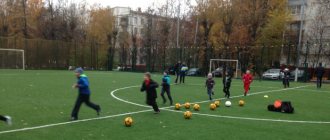Ecology for children
Childdevelop invites preschoolers and schoolchildren to join the study of the most pressing global problem - environmental issues on the planet. We offer practical exercises with colorful illustrations and simple accompanying text. The tasks are designed in such a way that young minds gain knowledge, acquire an understanding of the fragility of the World, and the importance of this information. Therefore, a series of thematic exercises on ecology for children will be an excellent addition to basic subjects. Simple, convenient texts will delight schoolchildren and their parents.
Skill of the future: why it is important to talk with children about ecology
Children are our future, so our tomorrow depends on what we tell them today. We talked about the importance of environmental education with Anna Gorshkova, coordinator of the Ekoclass.rf portal.
Why is it important to engage in environmental education for children?
It is obvious that today man influences nature so much that it simply does not have time to cope with it. But our well-being also depends on the health and well-being of nature, since we use all its benefits and resources. And it is obvious that having a healthy and comfortable environment is, first of all, a necessity for ourselves.
It is necessary to tell children about this from an early age, because such knowledge, view of the world, thinking and habits are formed in preschool age. The child is more open and receptive, it is easier for him to try something new, to build, among other things, ecological thinking.
In addition, children are the future of our world: politicians, teachers, ordinary people. What kind of thinking and views we help them form in childhood determines what our world will be like.
Ecological thinking is the skill of seeing relationships in nature, seeing how our actions affect the environment, feeling responsible for today and for the future. In the next 5–10 years, this attitude will be vital in all areas of human life, in any company, in any position. And in every profession, environmental thinking will become one of the basic skills, so it should be instilled from childhood.
Where to start with environmental education of children?
I would advise you to observe what the child is interested in and try to approach it from that direction. As a child, I was interested in animals and nature, which is why I grew up as an ecologist.
Someone might be interested in economics—you can talk about ecological economics.
I also recommend that parents raise their children by example, because they subconsciously repeat the actions of adults. Any eco-habits that can be practiced at home (not using plastic bags or turning off the water and lights) must first be introduced into your life. So, it will not seem complicated to the child.
And, of course, I would start by explaining and demonstrating how diverse, beautiful and unique the world around is. Show why it is worth saving. Show me how amazing everything is! After all, you can watch films and read books on this topic.
How to apply the acquired knowledge in practice?
I repeat, introduce eco-habits. For example, you and your child learned that plastic is bad. Now it is important to move from theory to practice. The easiest way is to start sorting waste, using reusable things, so that there is a connection: there is a problem - I can influence it.
What tips can you give for raising children of different ages?
Very roughly, we divide children into three large age groups:
Children under 7 years old. The influence of parents plays a big role here. By personal example it is worth showing the right habits, helping, giving the opportunity to study, be more in nature, and see what is happening in the world. You can add an interactive format and turn everything into a game.
Children 7-14 years old. At this age, children begin to read actively, you can take advantage of this and give them thematic books. Plus, there are many different cartoons and films on the topic of ecology for children. In elementary school, many are asked to make their own project, so suggest doing it specifically on an environmental theme.
Children from 14 years old. At this age, you can participate in projects on a more serious level: how to make school more environmentally friendly, change your eco-habits. You can volunteer or intern to participate in youth conferences and movements. This is a good experience and sometimes even career guidance. It is possible to take class trips to protected areas, a biological station, or visit biocircles. The main thing is to try to be active at any age.
The concept of “ecological education”
Although the concept itself arose recently, environmental education as a type appeared many, many centuries ago. One can say even more - in the past, any upbringing and education was, in part, environmental. By learning the laws of nature, man identified himself with the whole world, which allowed him to harmoniously merge into it without violating laws and norms. After the situation worsened (from about the 60s of the 20th century), people started talking about the value of nature and the importance of environmental education.
The concept itself means “education in harmony with nature. Not “above” and not “under”, but precisely in harmony, within it, as a single whole of one organism - man and nature.
Practical application of ecology
After completing the training, you will learn not only the theory, but the acquired knowledge will also be able to be applied in practice. Ecology in pictures will answer children's questions: how to take care of the environment outside the home, how to be useful every day. Even the simplest actions can be very important and useful. Children's ecology activities are a powerful tool for developing basic, vital skills.
In everyday life:
- Energy saving. When leaving the house, you must turn off all lights and all electrical appliances.
- Save paper. It is worth drawing on both sides of the paper, this way you can save the life of more than one tree. The tasks will also tell you that recycling waste paper also has a beneficial effect on the preservation of forests, because just one ton of waste paper saves the life of 25 trees.
- Saving water. The issue of fresh water supplies has long been of concern to scientists.
Outside the house, going for a walk, every student will know exactly why to follow the following rules:
- Do not break healthy branches on trees.
- Do not catch insects, they are useful and necessary for nature.
- Don't leave trash behind.
- Do not bring home healthy birds or animals.
- Don't destroy anthills.








